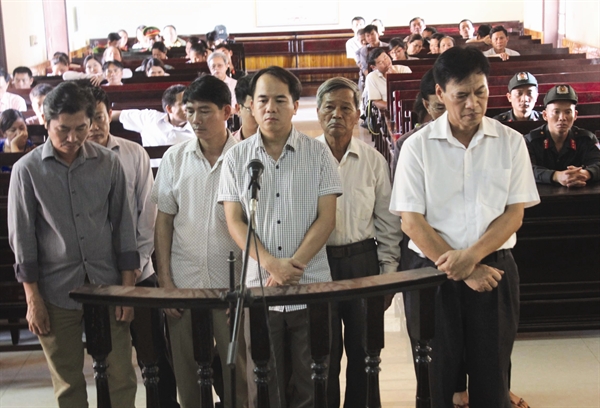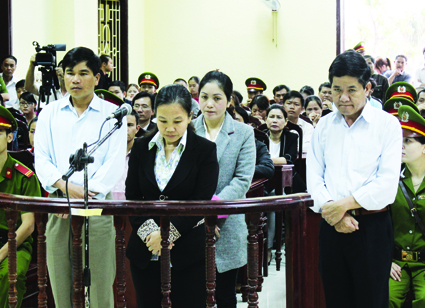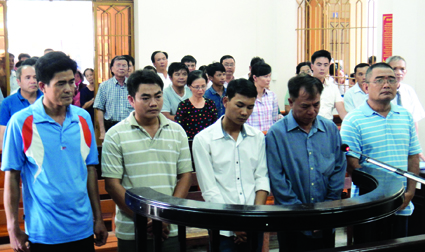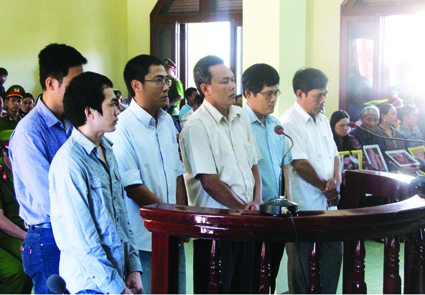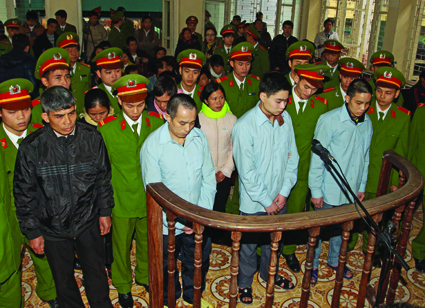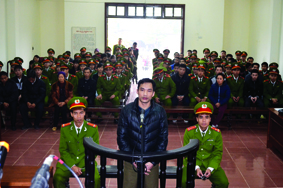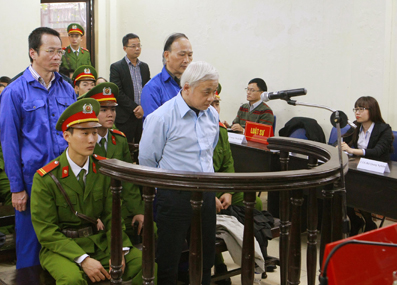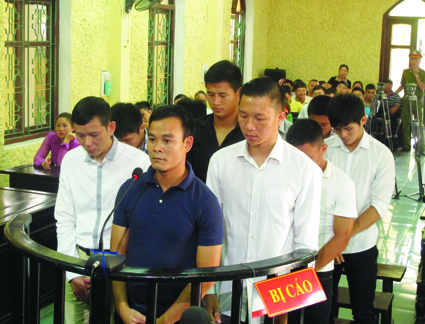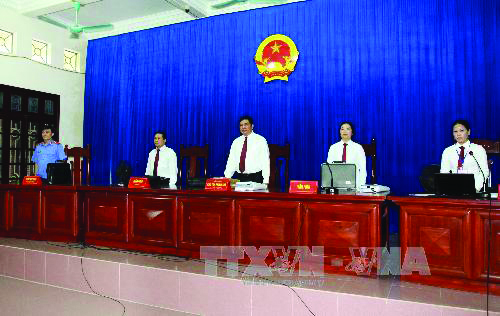Nguyen Ngoc Kien, LL.M
Hue University
Principle of guaranteeing the equal right before court
The international law clearly defines the right to a fair trial as an essential condition for human rights protection in a civilized society. Article 14 of the 1996 International Covenant on Civil and Political Rights (ICCPR) and Article 10 of the 1948 Declaration of Human Rights both stipulate that everyone shall be entitled to a fair and public hearing by a competent, independent and impartial tribunal established by law.
In the spirit of the above provision, Article 19 of Vietnam’s Criminal Procedure Code (the Code) stipulates:
“Procurators, defendants, defense counsels, victims, civil plaintiffs, civil defendants, persons with interests and obligations related to the cases and their lawful representatives and defense counsels of interests of the involved parties all have the equal rights to present evidence, documents and objects, make claims and argue democratically before court. Courts shall create conditions for them to exercise these rights with a view to clarifying the objective truths of the cases.”
This principle stems from Vietnam’s constitutional provision that all people are equal before law. However, the Code’s current provisions fail to create a mechanism for exercising “equal rights to present evidence” and “to argue democratically before court.” The collection of evidence still rests with the State, with procurators and the trial panel presenting evidence at court, but not defense counsels and defendants. In practice, in the adversarial process, defense counsels are usually inferior to procurators in terms of both legal status and seating in the courtroom.
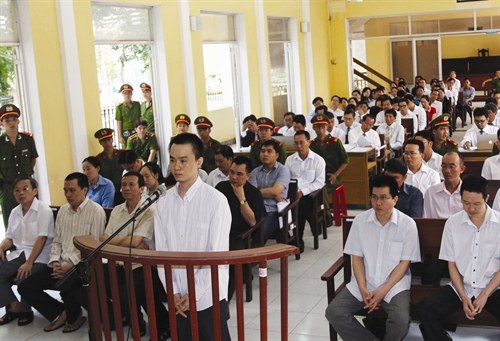 |
| Defendant Lam Minh Man at the hearing for swindling and breaching regulations on lending of credit institutions in Soc Trang province __Photo: Trung Hieu/VNA |
To change this practice, in addition to establishing the principles of adversarial process and presumption of innocence, it is necessary to create a mechanism to guarantee these principles in reality with specific provisions allowing defense counsels and defendants to collect evidence and call witnesses before and during hearings. For example, defendants should be entitled to collect evidence, witness crime scenes, take statements of witnesses and other procedure participants, request related agencies, organizations and individuals to provide documents and material evidence related to the cases, be present in the process of autopsy, and witness arrest and search. Only having their right to collect evidence guaranteed, can defense counsels, defendants and other procedure participants present valuable evidence during the adversarial process. The more defense counsels are involved in investigating activities, the more conditions they may have to collect evidence and to be equal in presenting evidence and proof before court. Only so, can the principle of guaranteeing the equal right before court be feasible.
Principle of guaranteeing the right of the accused and defendants to counsel
Enshrined in the constitutions of many countries, this important right is necessitated by, and exists in the presence of, accusations. In other words, where there is an accusation, there is a defense. Proper exercise of the right to counsel is the most effective tool to safeguard human rights in criminal justice. In this regard, the relevant provisions of the ICCPR (Clause 3, Article 14) are very specific and progressive compared to Vietnam’s criminal procedure as they (i) require everyone, in the determination of any criminal charge against him, be informed promptly of the nature and cause of the charge against him; (ii) attach importance to call and examination of witnesses by the accused or defendant before court (including those testifying against him); and (iii) clearly state the right of the accused or defendant to remain silent (not to be compelled to testify against himself).
In Vietnam, the right to counsel is enshrined in the 2013 Constitution as follows:
“A person who is arrested, held in custody, temporarily detained, charged with a criminal offense, investigated, prosecuted or brought to trial has the right to defend himself or herself in person or choose a defense counsel or another person to defend him or her.” (Clause 4, Article 31).
Article 11 of the Code also stipulates:
“The detainees, accused and defendants have the right to defend themselves in person or ask other persons to defend them. Investigative agencies, procuracies and courts have the duty to ensure that the detainees, accused and defendants exercise their right to counsel under the provisions of this Code.”
However, other provisions of the Code fail to create a mechanism to guarantee the practical realization of this principle. The revision of the Code should translate the constitutionally enshrined principle as well as the progressive features of the right to counsel in the international instruments into specific provisions.
The right to counsel exercised at first-instance hearings helps defendants rebut charges against them in verdicts and adverse statements of other procedure participants. Defendants may defend themselves in person by answering questions or presenting evidence to prove their innocence or to protect their or other persons’ interests. They may also remain silent, refusing to answer questions; in this case, the trial panel and prosecutors must ask other procedure participants and examine the cases based on other evidence. In the questioning time at a first-instance hearing, the openness of the hearing would help the defendant clearly testify to facts and circumstances of the case not yet discovered through investigation. His statements may lead to a change in subsequent criminal proceedings, such as postponement of the hearing, return of the case file for additional investigation, declaration of his innocence or withdrawal of the prosecution decision, or ruling on a less serious crime. When the hearing proceeds to the argument session, the defendant and other procedure participants should be allowed to present evidence and statements in an open and equal manner and argue with the accusers in an unlimited period of time. In practice, due to their limited legal knowledge, defendants usually need legal aid from a defense counsel. The Code specifies cases in which the presence of a defense counsel at the hearing is compulsory.
If defendants properly exercise their right to counsel at hearings, they would be get better protection by law. This, of course, depends on the condition that defendants’ evidence and arguments are seriously taken into consideration by the court when deliberating and pronouncing judgments. However, defendants can hardly do so because procurators are not required by law to provide them with clear explanations about the verdicts, particularly specific information about their charges. In reality, trial panels merely ask defendants whether they have received or heard the verdicts or what are their opinions about the verdicts. This has affected the right of defendants to defend themselves in person.
In order to uphold the principle of guaranteeing the right of the accused and defendants to counsel, we find it necessary to:
Firstly, make provisions to ensure equality between the prosecution and the defense, facilitate democratic arguments at hearings (e.g., the questioning responsibility should rest only with prosecutors and defense counsels, while the trial panel should only direct the hearing, make judgments and raise questions when necessary), and allow defendants and procedure participants to make questions.
Secondly, allow defense counsels to make defense right from the stages of initiation of a criminal case and investigation; create legal grounds and favorable conditions for defense counsels to collect evidence and make case files.
Thirdly, additionally recognize the defendants’ right to legal aid to support their self-defense, right to be present at or absent from a hearing (not only an obligation as currently prescribed by the Code), and right to choose whether they are tried by both assessors and judges or only by judges.
Principle of presumption of innocence
In light of the international law on human and civil rights, the 2013 Constitution of Vietnam recognizes the principle of presumption of innocence in Clause 1, Article 31:
“A person charged with a criminal offense shall be presumed innocent until proven guilty according to a legally established procedure and the sentence of the court takes legal effect.”
The Code has a similar provision in Article 9: “No person shall be considered guilty and be punished until a court judgment on his/her crime takes legal effect.” Though this provision has been regarded by procedure-conducting persons in Vietnam as conveying the principle of presumption of innocence, it really should not be because: (i) The title of the article does not mention the presumption of innocence, and (ii) the connotation of this provision is narrow and does not mean that (a) upon any doubt about the assessment of evidence and facts of a case, all explanations must be in favor of the accused or defendants and must not worsen their situation; (b) during the settlement of a case, no prejudice and assertion against the accused or defendants is allowed, and (c) the State has the entire burden of proof.
In order to have a correct perception of the presumption of innocence for practical application, there should be provisions that the prosecution bears the entire burden of proof in trial, defendants are entitled but not obliged to prove their innocence and their confessions, if any, may only be considered evidence if they are consistent with other evidence of the case. Procedural steps at a hearing must be fair enough to prevent prejudice of the court against the defendant and preconception of procedure-conducting persons about the trial outcome. Similarly, acts leading to partial collection and examination of evidence (e.g., collecting only incriminating evidence and refusing to seek evidence of innocence of defendants) must be prohibited.
Adversarial principle
This principle requires that the prosecution and the defense at a first-instance hearing can present their adversary views and arguments on an equal footing in order to clarify facts before the trial panel, which functions to ensure the lawfulness of the adversarial process. The adversarial process starts when the first-instance hearing is opened and ends when the court pronounces the judgment, the case is suspended, or the prosecution decision is cancelled. It may continue at the appellate hearing if both the prosecution and defense are present to make questions and arguments. It should be perceived that the adversarial process at first-instance hearings is not only for questioning and arguments but also for defendants, defense counsels and other procedure participants to make their claims and petitions, which may run counter to the interests of adversary parties and may be rejected by the court.
We propose some supplementations to the Code in order to specify Clause 5, Article 103 of the 2013 Constitution (“The adversarial principle shall be guaranteed in trials”) as follows:
Firstly, adding provisions that the prosecution and the defense can make questions and arguments without limitations or prejudiced intervention by the court. The court would only verify evidence and facts, conduct the hearing and make judgments and may only make additional questions if questions made by the adversaries are not enough.
Secondly, creating a mechanism for the defense to collect evidence and ensuring equal rights of adversaries and independence of the court.
Thirdly, defining the adversarial process in the Code as activities of the prosecution and the defense to prove facts through openly presenting their arguments and counter-arguments at a hearing conducted by the trial panel in order to protect the interests of the defendant, other procedure participants, the State and society.-
